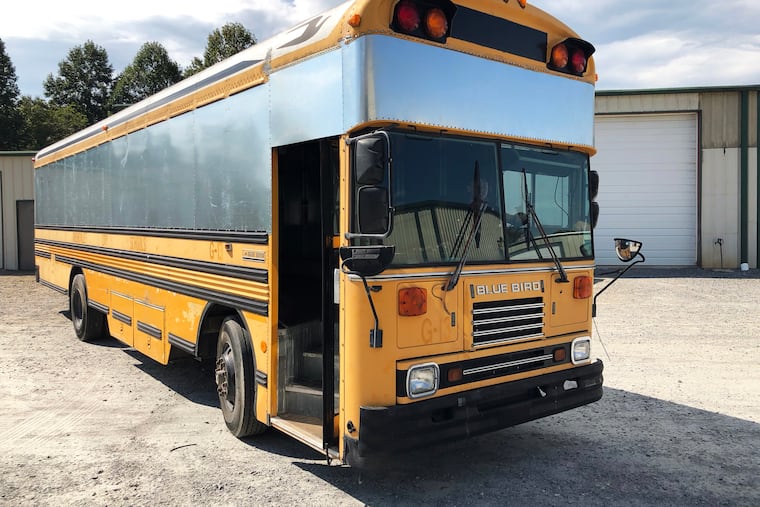The road less traveled for homeownership: A converted, one-of-a-kind school bus
Launched in the 1970s as part of the hippie culture, the "skoolie" movement is growing, encompassing smart, custom-crafted little homes that have handsome finishes and high-tech features.

For now, Nick and Francesca Drez are happy in the Denver area. But if they decide to relocate, all they have to do is drive their home down the road.
Their house is mobile but isn’t a recreational vehicle. It was once a school bus. Homes like this are called skoolies.
Launched in the 1970s as part of the hippie culture, the skoolie movement is growing, encompassing smart, custom-crafted little homes that have handsome finishes and high-tech features. With their full metal frame, robust structure, large tires, and height above the ground, skoolies are regarded by many to be sturdier and safer than typical RVs.
The Drezes, both 27 and married for three years, had been living in a 1,400-square-foot townhouse in the Chicago area, but it never felt right. For one thing, “the kitchen and one bedroom were all we used,” Francesca Drez says.
Plus, traditional home ownership was expensive, with mortgage, utilities, homeowners’ association fees, and other costs. And, perhaps the most important factor: The couple dreamed of traveling.
The Drezes learned of skoolies while watching a documentary on Netflix. More research led them to Luke and Rachel Davis, who not only lived in a school bus they had converted into an appealing home, but also had chronicled their mobile life on a website and Instagram. They have a business in Hendersonville, N.C., called Skoolie.com, that provides customized bus conversion.
“The stars really lined up,” Francesca Drez says. The Davises’ own bus included features appealing to the Drezes, such as a beautiful coffered ceiling, a raised roof, and an open layout.
Francesca and Nick found a 20-year-old school bus with 168,000 miles online, and Skoolie.com helped evaluate it.
Located in Greensboro, N.C., it was a 38-foot-long Blue Bird bus with a flat nose — yielding an extra four square feet of usable space that a dog-nose bus doesn’t have — and a Cummins diesel engine, the holy grail of engines for skoolies, Nick Drez says. The engine and all the mechanicals were in excellent condition.
So, too, was the metal body; coming from central North Carolina, it had none of the rust that often plagues vehicles from coastal areas awash in salty sea air. With a new alternator and tires, new oil filter, oil change and fluids, it was good to go.
Using a SoFi personal loan, the Drezes bought the bus in June 2018 for $5,000. Skoolie.com began the $55,000 gut-and-build months later. The total cost was “much cheaper than a house, an RV, or an RV mortgage," Nick Drez says. In late January 2019, the Drezes moved in, choosing to do some of the finish work and build-out themselves. They sold their townhouse several months later and are on their way to paying off their loan, slashing monthly living expenses to about $800 (fuel and food included), Nick Drez calculates.
The Davises opened Skoolie.com in December 2017. The schedule includes about four full builds a year — each taking five or six months — plus many roof raises, numerous solar-energy systems, and dozens of parts fabrications for DIY customers.
Skoolie.com customers run the gamut from middle-aged couples, to owners with small and large pets, to families with as many as five children. The Davises share their own 220-square-foot bus with their two small children.
“About half of our customers bring a bus,” Rachel Davis says, “and we’ve shopped on behalf of others.” Used buses cost $4,000 to $10,000. Some customers hand over all design and construction to Skoolie.com, reviewing the work via online updates every step of the way. Others want to do some of the work themselves.
Nick and Francesca Drez’s skoolie features a 10-foot couch that pulls out to a bed, standard-size kitchen cabinets and drawers, a small wood-burning stove, a propane-fueled oven and four burners, a side-by-side refrigerator-freezer, recessed LED lighting, a step-up shower, and a composting toilet. Wood panels from the Blue Ridge Mountains run across the raised, almost eight-foot-high coffered ceiling, and white-painted shiplap covers the walls. The flooring is waterproof vinyl. Nick and Francesca finished the shower room with sheet-stone tile flooring and subway-style wall tiles.
Their skoolie could go totally off grid, Nick says. “Most of our systems can run on gas and electricity,” he says, but the five solar collectors produce enough watts to power the bus’ needs for three to four days without sun. The Drezes have a portable generator as backup.
To live in a skoolie requires extreme downsizing. Even with their bus’ generous undercarriage storage and other pockets of space, the Drezes pared down to the essentials and what they loved. Frequent trips to the laundromat make a tiny wardrobe possible.
Having lived in the skoolie since January, Francesca Drez says it has become “truly a home.” And after moving every week or two from one park or campground to another, the Drezes landed a spot with no hookups in an RV park that they rent on an affordable monthly basis and can leave and come back to. Though they are stationary now, they plan to travel, which, they say, their new home makes possible.